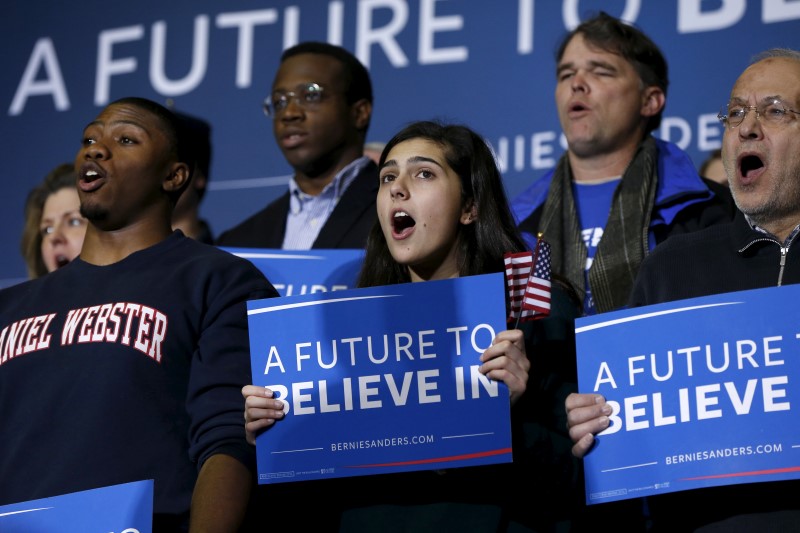By Emily Stephenson
ORANGEBURG, S.C. (Reuters) - If Democratic hopeful Bernie Sanders has a chance of drawing African-American voters away from rival Hillary Clinton in South Carolina's presidential nominating contest on Feb. 27, his best opportunity will be among the young.
African Americans support former Secretary of State Clinton by more than a 3-to-1 margin nationwide, but among young blacks 18 to 29 years old, that margin shrinks to 46 percent for Clinton versus 33 percent for Sanders, according to recent Reuters/Ipsos polling.
African Americans overwhelmingly back Democrats, but opinion polls in the run-up to the Nov. 8 presidential election show younger blacks more apt to reject an establishment candidate. They seem less inclined than their parents to reward Clinton for the outreach of her husband, former President Bill Clinton, and more drawn to Sanders’ outspoken views on reducing income inequality, cracking down on Wall Street, and cutting the cost of college.
Reuters/Ipsos polling last year showed that 36 percent of blacks between 18 and 29 years old thought the country was on the “wrong track,” compared with 23 percent of blacks who were at least 60 years old.
For Sanders, a U.S. senator from Vermont who describes himself as a democratic socialist, this trend could help him chip away at Clinton's firewall of minority voters in the southern states, after his strong showings against her - especially among the young - in the early Democratic Party contests of Iowa and New Hampshire, both more than 90 percent white.
The voting-age population in South Carolina, one of the next stops on the primary trail, is about 67 percent white and 27 percent black, the U.S. Census Bureau says.
In Orangeburg, South Carolina, students at the historically black schools of South Carolina State University and Claflin University appeared split this week over which of the two candidates to support.
Students praised Clinton’s work on behalf of women and minorities and her years of Washington experience. But many said they also were intrigued by Sanders’ plans to raise taxes on wealthier people and Wall Street firms, provide universal healthcare and offer free public college tuition.
"The history is important. But at the same time ... you still need a plan," said Travis Pascoe, 25, a second-year graduate student at Claflin. He said Sanders' plans for reducing inequality by taxing the wealthy and expanding Medicare to cover all Americans should resonate with the black community.
"I think that would help the black community because we’re the least privileged," he said.
Eight of 16 students interviewed were undecided voters. Of the eight students whose minds were made up, four students said they planned to vote for Clinton.
Ethel Hillman, 25, a freshman who served in the military before going to college for social work, said she and many of her fellow students were voting for Clinton. She described Sanders as too aloof.
"He’s not socially connected, I would say, to the black community," she said. "He cares from a distance."
VYING FOR YOUNG VOTERS
South Carolina State’s student center, which houses a bowling center and dining area, has quotes on walls from prominent black leaders, including President Barack Obama and first lady Michelle Obama, singer Michael Jackson and educator Booker T. Washington.
On one wall is a memorial to students killed in the 1968 "Orangeburg massacre," when protesters were shot by state highway patrol officers on campus amid tensions over racial discrimination.
For Sanders, minority voters have been a lingering weakness. He struggled early in his campaign to appeal to black voters. Protesters from the Black Lives Matter movement interrupted his speeches, viewing him as out of touch with black issues.
To counter that perception, Sanders touted his college civil rights activism, did publicity events with rapper Killer Mike, and on Wednesday met black civil rights leader Al Sharpton in Harlem.
Like Clinton, Sanders has sent surrogates to historically black colleges. The writer and activist Cornel West spoke at South Carolina State on Sanders’ behalf, and actress Angela Bassett spoke there in support of Clinton.
Where Sanders is fighting for inroads into the black electorate, Clinton finds a comfort zone.
Her campaign has said it believes its road to the nomination would become smoother once it moves south, to places where she and her husband, the former president, have ties to minority leaders. Clinton picked up the endorsement of the Congressional Black Caucus political action committee on Thursday.
As the stakes mount in South Carolina, Representative Jim Clyburn, one of the state’s most influential Democrats, said he was considering endorsing a candidate. He did not endorse in Hillary Clinton's 2008 primary race against Obama, and previously said he would not weigh in this year.
His wavering was echoed in the views of several students on the campus of South Carolina State.
"I’m kind of caught between Bernie Sanders and Hillary," said Kelsie Bryant, 19, a sophomore education major at South Carolina State. She said it was important to have a woman president, and she was worried Sanders was too old. But she said his meeting with Sharpton sent a positive signal about his outreach to blacks.
Cetris Brooks, 21, a senior biology major at South Carolina State, said that ultimately she was "a little bit more trusting" of Clinton because of what the former first lady meant to her family.
She said her parents had long supported Clinton, and her uncle knew the former president.

(This version of the story corrects paragraph 11 number of students backing Clinton to four instead of three, adds "political action committee" to paragraph 21)